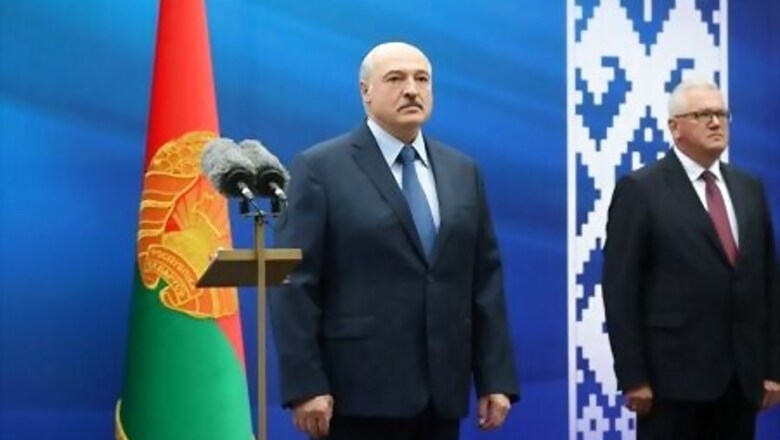
views
MOSCOW/KYIV: Alexander Lukashenko, the leader of Belarus, has thanked Russian state-backed television channel RT for providing journalists to help prop up Belarusian state media after hundreds of staff went on strike in protest against his rule.
Some Belarusian media workers have walked off the job during more than three weeks of protests over a disputed Aug. 9 presidential election marred by vote-rigging allegations that have triggered huge street protests against Lukashenko.
Russia, a close ally of Minsk, has stepped in to help Lukashenko weather the biggest challenge yet to his 26-year rule, providing diplomatic and other support while promising military help if necessary.
Lukashenko said that Kremlin-backed RT, formerly known as Russia Today, had played a vital role in helping Belarusian state media keep running despite the mass staff walk-offs.
“You understand how important you were to us during this difficult period. And what you demonstrated technically, your IT specialists, and journalists, and correspondents, and so on … and your manager. This is worth a lot,” said Lukashenko.
“I am grateful for this support,” the former Soviet state farm boss said in an interview aired by RT on Sept. 1.
The RT correspondent who conducted the interview told the Belarusian leader it was important to acknowledge that RT had not actually been taking people’s jobs.
Lukashenko said that he was fully briefed on the situation and was aware that RT was working “as our teams”.
RT told Reuters in a statement its crews “were able to provide some technical expertise to the local media” while in Belarus. RT was also able to share some video content as it does with other outlets, it said.
More than 300 Belarusian staff refused to continue working at several pro-Lukashenko state media television stations as part of an anti-government media strike that began on Aug. 17, strike coordinator Ksenia Lutskina told Reuters.
Many of them were critical technical staff, ranging from lighting specialists to cameramen, she said. More than a hundred people simply resigned.
Lutskina said Russian media staff began flying into Belarus a day after the strike began and were offered salaries of around $2,000 a month – higher than the national average wage and much more than outgoing Belarusians had been paid.
“One of the comrades on that plane coming in used to work with our guys earlier so we found out about this really quickly,” she said.
State television reports are now also being circulated on social networks. Lutskina said that in one such clip, the sound was edited to make it appear – falsely – as if protesters were chanting at prominent protest leader Maria Kolesnikova to “go away.”
Lutskina said Belarusian state TV coverage has changed radically under Russian influence and that the new arrivals appeared to be deliberately avoiding Belarusian staff who had remained at the media outlets.
“No one has actually seen the guys who do the text, they don’t sit with us,” she said.
Yekaterina Pytleva, a striking Belarusian media worker, said the channels had made unusual errors in their coverage, for instance referring to Belarussia as opposed to Belarus.
A spokeswoman for the Belarusian State TV and Radio Company declined to comment. She said she was not authorised to comment on statements by Lukashenko.
The Kremlin said RT took its own decisions about who to send where.
Disclaimer: This post has been auto-published from an agency feed without any modifications to the text and has not been reviewed by an editor
















Comments
0 comment